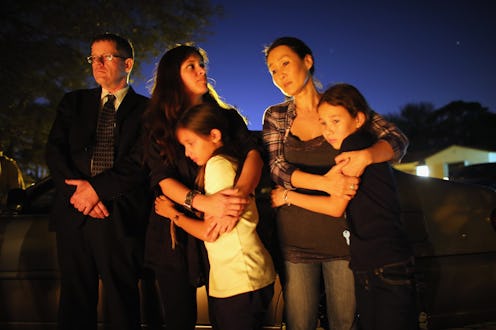News
It's Been Three Years Since Sandy Hook
On Dec. 14, 2012, exactly three years ago this Monday, 26 children and adults, excluding the shooter, were killed in a mass shooting at Sandy Hook Elementary in Newtown, Connecticut. On Monday, people in Connecticut and across the country honored the third anniversary of the tragic Sandy Hook shooting by reflecting on what happened and what still needs to be done, particularly in the wake of several other mass shootings that have damaged the country's morale. Despite the violence and persistent calls for stricter regulation, progress with gun control still lags, and public opinion still remains deeply divided.
The Sandy Hook shooting was the deadliest shooting at a high school or grade school in U.S. history, making it deadlier than even the notorious tragedy at Columbine High School in 1999. Following the shooting, parents and loved ones of the victims campaigned loudly for gun control reform in Connecticut and across the country, forming a group called Sandy Hook Promise. The group has handed out photographs of the loved ones they lost to lawmakers, and members have connected with parents and school officials across the country to advocate for programs that protect kids from gun violence. In Connecticut, they've seen substantial progress in gun control legislation — but across the rest of the country, such laws have often struggled to gain the support they need.
Within four months of the shooting, the Connecticut state legislature had imposed universal background checks for all firearms purchases and transfers and banned the purchase of ammunition magazines capable of holding more than 10 rounds. The state had already banned the possession of certain assault weapons, but these new laws directly responded to the need to prevent mentally ill people, like the shooter at Sandy Hook, from obtaining guns and the need to limit further the types of weapons anyone could purchase. The new laws even withstood a challenge in federal court on Second Amendment grounds: A federal judge upheld the laws because they were "substantially related" to the government's interest in crime control. Connecticut was even ranked the second toughest state on guns by The Law Center to Prevent Gun Violence.
Elsewhere, as The Associated Press reported Sunday, states have actually tended to move in the other direction, expanding gun rights or taking other approaches to safety that don't necessarily involve gun control. For example, in April, Kansas adopted a law that allows people to carry concealed weapons without a permit or training. Indiana and Mississippi have legislated to increase the presence of police officers in schools. Laws like these seem at worst counter-intuitive and at best unable to address the root of the problem.
When you consider public opinion, the inconsistent and often slow-moving approach to gun violence across the country makes a little more sense. In short, the nation did not agree at the time of the Sandy Hook shooting and still does not agree now on how to best mitigate the risk of gun violence. In December 2012, just days after the Sandy Hook shooting, Gallup found that 58 percent of Americans wanted stricter gun laws. That number represented a notable jump from the previous year, when just 43 percent of Americans wanted stricter gun laws, but 58 percent is by no means a universal consensus. Even now, three years later, Gallup measured in October that 55 percent of Americans support stricter gun laws. The number has fluctuated only slightly over the course of three years and too many mass shootings to think about.
Like most things legislative in the U.S., gun control progress has moved slowly, if at all, in the three years since tragedy struck Sandy Hook Elementary in 2012. Despite calls from victims' loved ones at the local level and President Obama at the federal level, states have seldom taken a firm approach to reducing the number of guns allowed on the' streets. There's the old adage that guns don't kill people because people kill people, but those people don't seem to have a hard time getting guns thanks to current laws.
